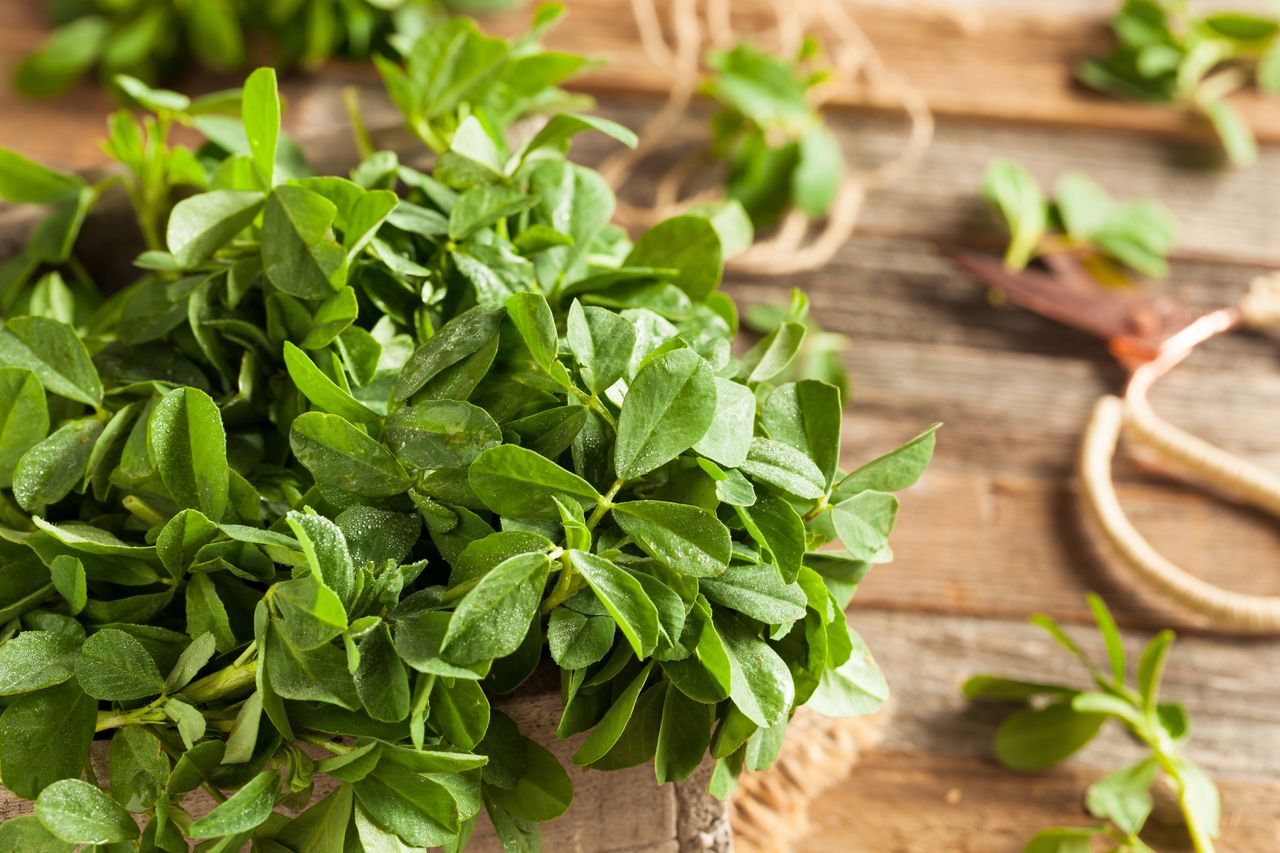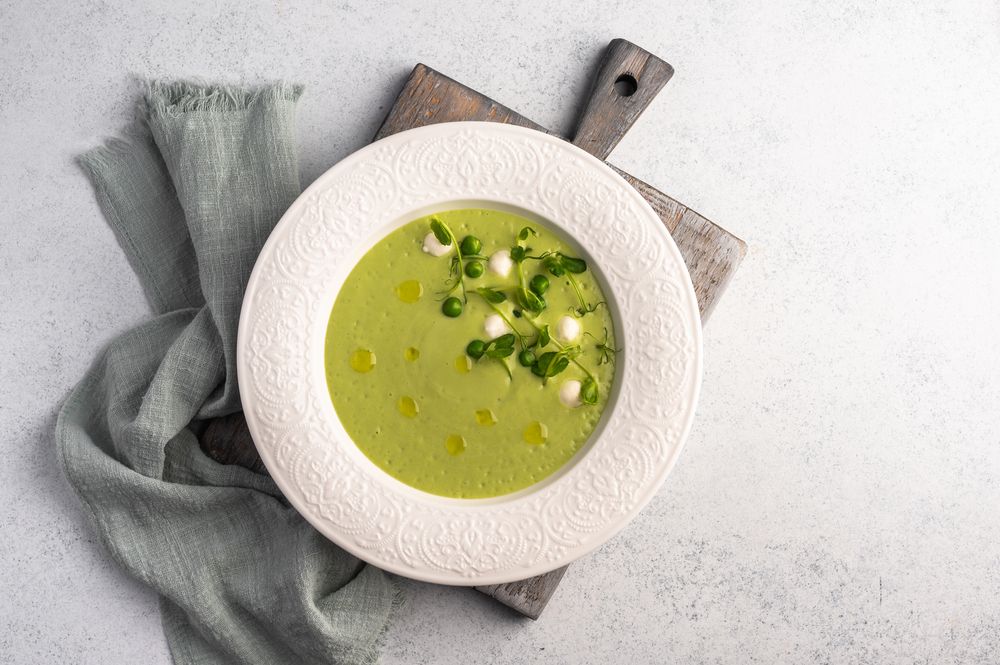[ad_1]
Fenugreek leaves are one of the healthiest green leafy vegetables. This versatile herb is from the legume family. It has been used in cuisines as a flavouring agent for decades. In addition, it is a widely used spice in multiple cuisines globally. They add a mild and aromatic bitter-nutty flavour to curries and stir-fries.
Moreover, every part of the plant is equally nutrient-dense. The fenugreek seeds are also quite similar to the leaves. The high point of these leaves is their health benefits. They are surprisingly nutritious and innumerable. Also, they are beneficial for women with polycystic diseases, PCOS. Research suggests that fenugreek is helpful for the heart, diabetes, skin and hair health.
The Fenugreek plant is native to Europe, Asia and Africa. It is also widely grown as a food crop in India, North Africa and Yemen. It has been part of traditional medicine for ages. Fenugreek is one of the oldest spices in the world. Farmers in India and Europe cultivate them extensively. Perhaps due to its unique and therapeutic features, one can use them as a helpful nutritional supplement to treat or prevent multiple diseases.
Nutritional Value of Fenugreek
Fenugreek leaves are widespread across the world. Their usage is prevalent across cuisine as a rich dietary fibre source. In addition, they are high in protein and other essential nutrients.
100g of fenugreek leaves contain
- Energy: 323 kcals
- Fat: 6.41g
- Carbohydrates: 58g
- Dietary fibre: 24.6g
- Protein: 23g
Vitamin and Minerals
Fenugreek leaves contain minerals in reasonable quantities. They also have reasonable amounts of vitamin A, C and B.
- Iron: 33.53 mg
- Calcium: 176 mg
- Sodium: 67 mg
- Potassium: 770 mg
- Copper: 1.11 mg
- Magnesium: 191 mg
- Phosphorous: 296 mg
- Zinc: 2.50 mg
Health Benefits of Fenugreek Leaves
Fenugreek leaves are herbs with extensive medicinal properties. They specifically contain anti-diabetic and anti-carcinogenic qualities. Their usage has been noteworthy in traditional and alternative medicine for ages. They improve digestion, skin, heart health and hair health. They also have antioxidant and anti-inflammatory properties.
Helps Control Cholesterol
High cholesterol levels cause diseases like atherosclerosis. It occurs due to the build-up of fat deposits within the arteries, obstructing blood circulation. As a result, it leads to stroke, high blood pressure and heart failure.
Studies suggest that intake of fenugreek leaves helps reduce cholesterol. They do so by reducing the release of bad cholesterol in the body. As a result, it prevents atherosclerosis. However, fenugreek also increases good cholesterol levels.
Weight Management
Obesity and unhealthy weight gain leads to many diseases. Some of the prominent ones are diabetes and heart diseases. In many cases, obesity occurs due to overeating. However, studies show that fibre aids in weight loss. Since fenugreek is high in fibre, it is known for its satiating properties. As a result, it ultimately helps control cravings. Additionally, it keeps you from overeating and helps you lose weight.
High in Antioxidants
Fenugreek is a rich source of antioxidants. They contain Vitamin C, Vitamin A, and beta carotene. Free radicals in the body result from poor metabolism, which unfortunately damages cells and organs in the human anatomy. This cell injury triggers many health disorders. The antioxidants in fenugreek can prevent cell damage by free radicals and thus, inflammatory conditions, infections, cancer etc. Some Studies demonstrate that fibre in fenugreek is exceptionally beneficial to us.
Prevents Gastric Disorders
Research shows that fibre in fenugreek works as food to the friendly gut microbes. They absorb water from the intestines and soften the bowel. Therefore, this makes it easier to excrete them. Fenugreek leaves also help in preventing indigestion. In addition, it reduces the risk of constipation and inflammation.
Beneficial for Diabetes
Diabetes is a prevalent lifestyle disease that occurs due to various factors. Some common causes are genetic and improper diet. If it worsens, it results in many adverse outcomes—delayed wound healing, nephropathy, neuropathy, to name a few.
Studies suggest that fenugreek helps regulate glucose. 4HO-Ile is an amino acid present in fenugreek with anti-diabetic properties. It stimulates insulin secretion and increases insulin sensitivity. Therefore, this helps to maintain steady blood glucose levels. Thus, fenugreek can help in the prevention of Type II diabetes.
Prevents Clotting Disorders
Fenugreek contains phenols. It is a potent antioxidant that helps in preventing blood clot formation. Blood clots obstruct blood circulation, interrupting the blood supply to the vital organs. Unfortunately, this ultimately even leads to cardiovascular disorders.
Skin and Hair Health
Fenugreek leaves contain vitamin C. It possesses antioxidant properties that prevent inflammatory disease. Vitamin C also stimulates collagen synthesis that gives firmness to your skin. Thus, it prevents wrinkles and also delays the signs of ageing. It also has healing properties. It contains mucilage and can even moisturise dry skin.
Omega-3 and -6 fatty acids prevent follicle inflammation that prevents hair loss. They also promote hair growth. Fenugreek has protein and nicotinic acid content. Therefore, the correct dietary usage may help prevent hair fall and dandruff.
Anti Cancer Properties
Several factors cause cancer. It involves the multiplication of cells beyond normal levels, which can occur due to oxidative stress, genetics, etc.
Fenugreek may have potential anticarcinogenic qualities. The saponins in fenugreek inhibit cancer cell growth. The study reveals that it may be effective in colon and prostate cancer. Moreover, they have shown remarkable cures in leukaemia and bone cancer.
Improves Kidney Function
Kidney stones result from improper dietary habits. It also occurs due to other factors like oxalic acid and calcium hydroxyproline.
Studies show that antioxidants prevent kidney stones. The antioxidants in fenugreek can help reduce their level and to avoid kidney stones from forming. Additionally, the anti-inflammatory properties in fenugreek help. It inhibits calcium deposition in the kidney, which prevents renal tissue injury.
Protects Liver
Fenugreek may reduce the radical cell injury in the liver. Alcohol and an unhealthy diet may worsen liver damage. The resultant damage may be liver cirrhosis. Studies show that fenugreek may reduce the risk of cirrhosis by reducing the activities of enzymes, thereby protecting the liver from damage.
Antimicrobial Activity
Fenugreek extracts have antimicrobial properties and thus, limit the multiplication of bacteria. Therefore, it offers protection against high potent bacteria. Studies show that defensin is another helpful component in fenugreek. It inhibits the proliferation of fungus. The antibacterial effects also improve wound healing.
Bone Health
Fenugreek is a rich source of calcium, magnesium and Vitamin D. They are essential for bone health. They strengthen the bones and stimulate bone healing. Therefore, they can prevent bone disorders. As a result, this includes fractures and osteoporosis.
Diosgenin is a compound in fenugreek. Research suggests that it restricts the synthesis of osteoclasts. Osteoclasts may be bone-resorbing cells which means they break bone tissues. They are prominent during osteoporosis – a disorder that makes your bones fragile and prone to fracture.
Female Reproductive health
Studies show that fenugreek can ease the menstrual cycle during irregular periods. It helps in uterine contractions and regulates your menstrual periods. In addition, they may improve the symptoms related to menstrual issues such as fatigue.
Improves Male Fertility
Research demonstrates that fenugreek extracts improve fertility. It helps improve the secretion of testosterone that is essential for sperm synthesis. Therefore, fenugreek compounds improve sperm count and quality.
Lactation
Fenugreek contains diosgenin and phytoestrogen, which mimic the female hormone oestrogen. However, the exact mechanism is unknown. Also, several studies have found fenugreek to improve breast milk production.
How to Include Fenugreek Leaves in Your Diet
Fenugreek leaves make various healthy dishes. It can be easily incorporated into your food and improves taste and nutrition. The fresh leaves are like any leafy vegetable, and the dried form works as a flavouring agent. Each has a unique flavour.
You can combine them in gravies, stir-fries and parathas. It also goes as a garnish in dal, paneer and meat-based preparations. In addition, fenugreek tea is a decoction for fever in traditional medicine.
Fenugreek Leaves Recipes
Fenugreek Leaf Salad
- Preparation Time:15 minutes
- Serves: 2
Ingredients
- Fenugreek leaves: 50 g
- Chopped onion: 50 g
- Chopped tomato: 30 g
- Olive oil: 5 ml
- Lemon juice: 5 ml
- Jaggery: 5 g (optional)
- Crushed pepper: 2 g
Instructions
- Add oil to a heated pan and add onions.
- Saute for a minute. Then add fenugreek leaves.
- Cook for 5 minutes or until the leaves are cooked.
- Transfer to a bowl and add chopped tomatoes.
- Mix well and add crushed pepper, lime juice and salt.
- You can also add jaggery to get a sweet flavour.
2. Fenugreek Soup
- Cooking time 10 minutes
- Serves: 1
Ingredients
- Fenugreek chopped leaves: 200 g
- Tomato: 20 g
- Crushed garlic: 2 g
- Crushed black pepper: 2 g
- Water: 200 ml
- Chopped onion: 20 g
- Olive oil: 5 ml
Instructions
- Add oil to a pan on medium flame. Now add chopped onion and garlic.
- Saute for 2 minutes. Then add chopped leaves.
- Saute for 3-4 minutes and add chopped tomatoes.
- Mix well.
- Add water and bring it to a boil.
- Simmer for 2 minutes
- Add salt and crushed pepper. Serve warm
Adverse Effects and Precaution for Fenugreek Leaves
Allergy
Fenugreek leaves are full of nutritional value. They have several benefits. However, do not overeat fenugreek. Excess consumption has adverse effects. In addition, a study suggests that fenugreek may trigger an allergic reaction in some sporadic cases.
Inflammatory Bowel Disease
Fenugreek leaves contain a good amount of fibre. Studies suggest that high fibre may cause discomfort in people with IBS. It is advisable to consume them cautiously. When taken in excess, it may cause symptoms including
- Abdominal pain
- Cramps
- Diarrhoea
- Headache
- Dizziness
Pregnancy
A study suggests that fenugreek leaves cause preterm childbirth or miscarriage. Therefore, it is advisable to consult a physician before including fenugreek leaves.
Diabetes
Fenugreek reduces blood sugar levels. However, if you are on any diabetes medication, it may cause fluctuations in your blood glucose levels. Therefore consult your doctor before including fenugreek in your diet.
Summary
Fenugreek leaves have been used for ages for multiple reasons and are one of the oldest medicinal herbs. The whole fenugreek plant has medicinal properties. It is a popular culinary herb across the world. In addition, the seeds are the flavouring agent. The fresh green leaves make multiple healthy dishes.
In short, fenugreek is a prophylactic, which prevents health disorders. You may quickly include it into your diet to yield its benefits. It’s an annual plant extensively cultivated as a food crop in India, the Mediterranean region, North Africa and Yemen. The Fenugreek seeds and herbs are well known for their distinct aroma and slightly bitter taste.
Frequently Asked Questions (FAQs)
Q. What are fenugreek leaves good for?
A. You can use the fenugreek leaves to treat indigestion, gastritis and constipation. In addition, it is effective in managing cholesterol, liver disorders, reproductive disorders and many more. It also helps in bone, skin and hair health.
Q. Is fenugreek leaf safe?
A. Yes, they are safe but only with recommended doses. They are a natural remedy for multiple disorders. However, expecting mothers should talk to their medical health professionals before consumption. It is essential to rule out any allergic reactions before including them.
Q. How do fenugreek leaves help in weight loss?
A. Fenugreek leaves are packed with dietary fibre. Fibre may take time to digest. It gives you a fuller and satiated feeling. Thus, it may prevent you from overeating. It also controls binge eating unhealthy snacks. Thereby, fenugreek leaves help in managing weight.
Q. What does fenugreek do for females?
A. Fenugreek may help with irregular periods. It also reduces the symptoms associated with irregular menses. It also promotes lactation. Thereby, it may contribute to improving overall reproductive health in women.
Q. Who should not take fenugreek?
A. Fenugreek may not be recommended to expecting and lactating mothers. In addition, it might be unsafe for children as it can be allergic to children. Therefore, you should take medical advice before including it in your diet or as a supplement.
Q. Can fenugreek cause hair loss?
A. No, it does not cause hair loss. Instead, fenugreek may help to maintain hair health. It may also prevent hair loss, dandruff and itchy scalp.
Q. Do fenugreek seeds reduce belly fat?
A. Fenugreek leaves are rich in fibre. Fibre slows down digestion and delays hunger. Therefore, it reduces food cravings. That causes you to crave less for unhealthy snacks. As a result, it aids in weight loss. However, it cannot burn belly fat by itself.
Q. Can we drink fenugreek water daily?
A. Yes, fenugreek is nutrient-loaded. Daily intake of fenugreek water boosts metabolism. It may help you lose weight and suppress your hunger.
Q. What happens if you drink fenugreek water every day?
A. Regular intake of fenugreek water may provide antioxidants. It may regulate your blood sugar levels. Additionally, they also help in reducing oxidative damage.
Q. How many calories are in a cup of fenugreek leaves?
A. One cup of fenugreek leaves contains 576 calories.
Q. Are fenugreek leaves high in protein?
A. Yes, they have high protein content. Proteins are crucial for the growth and function of your cells. In addition, they are essential during cell repair and all metabolic activity of cells. They help antibody synthesis. Antibodies help fight illness and help you maintain your health.
Q. Which is better: fenugreek seeds or leaves?
A. Both the seeds and leaves have a different flavour. They may taste different. However, the nutrient benefits are similar.
[ad_2]
Source link





